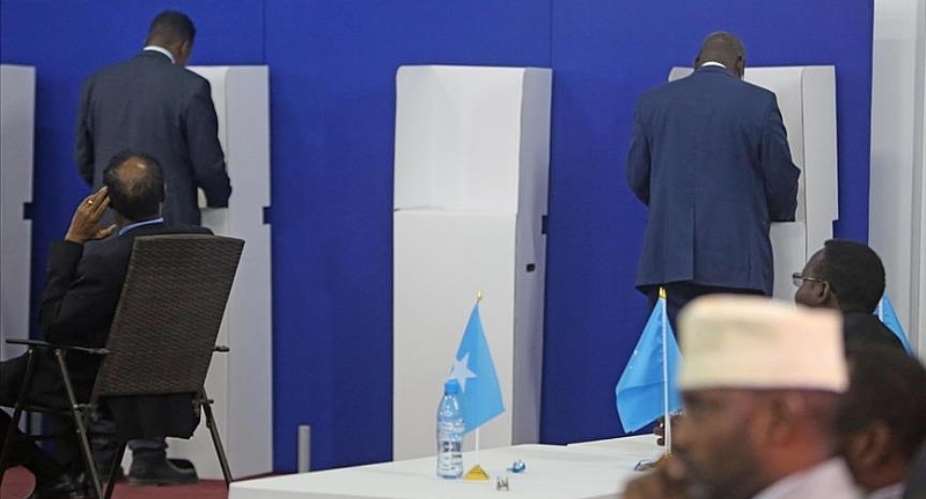"Jibril Mohamed Ahmed Calls for Direct Elections in Somalia's 2026 Election Cycle"
The indirect electoral model and 4.5 power-sharing formula have been the norm in Somalia's elections for the past two decades. The system was introduced in 2000 and was meant to be a temporary measure, but it has become a permanent feature of Somalia's political landscape. However, this electoral model and power-sharing formula have been heavily criticized by many Somalis and international observers for being undemocratic, discriminatory, and perpetuating clan-based politics.
The 4.5 power-sharing formula allocates 4.5 seats in parliament to four major clans, with the remaining half of the seats being divided among minority clans. This formula has been criticized for perpetuating clan politics and marginalizing minority groups, particularly women and youth. The indirect electoral model, on the other hand, involves a complex system of clan elders and delegates selecting parliamentarians and the president, without direct input from the general population.
There have been several key events that have highlighted the flaws of the current electoral system in Somalia. In the 2016 elections, for instance, allegations of vote-buying and manipulation marred the process, leading to a delayed and disputed outcome. The 2020 elections were also postponed due to disagreements between the federal government and regional states over the electoral process.
According to Dr. Abdiweli Ali, a Somali scholar and former prime minister of Somalia, "The current electoral system in Somalia is undemocratic, discriminatory, and perpetuates clan-based politics. It is time for the country to adopt a more inclusive and democratic electoral system that reflects the aspirations and needs of all Somalis."
The prospect of one person, one vote in 2026 presents an opportunity for Somalia to break away from the current system and adopt a more democratic electoral process. The One Person, One Vote (1P1V) model would involve direct elections, with every Somali citizen having an equal say in the selection of their representatives.
However, the implementation of the 1P1V model in 2026 requires significant reforms and investments in Somalia's political and electoral systems. The Somali government needs to build an inclusive and independent electoral commission that can oversee the electoral process and ensure transparency and fairness. Additionally, there needs to be a comprehensive voter education program to ensure that all Somalis understand the electoral process and their rights and responsibilities as voters.
Moreover, the current administration needs to take immediate steps to implement the 1P1V model in the upcoming elections. This would require political will, resources, and a commitment to democratic governance. The government also needs to engage in dialogue with regional states and other stakeholders to build consensus on the electoral process and ensure that everyone is on board.
The implementation of the 1P1V model would have several benefits for Somalia. First, it would promote democratic governance and the rule of law, enabling the people of Somalia to have a say in the selection of their leaders. Second, it would promote inclusivity and diversity, ensuring that all Somalis, regardless of their clan or background, have an equal say in the political process. Third, it would promote stability and peace, by ensuring that the electoral process is transparent and fair, and that the outcome is accepted by all stakeholders.
In conclusion, the current electoral model and 4.5 power-sharing formula in Somalia must be discarded to promote democratic governance and inclusivity. The prospect of one person, one vote in 2026 presents an opportunity for Somalia to break away from the current system and adopt a more democratic electoral process. However, the implementation of the 1P1V model requires significant reforms and investments in Somalia's political and electoral systems. The current administration must take immediate steps to implement the 1P1V model in the upcoming elections, build consensus with regional states and other stakeholders, and ensure that the process is transparent, fair, and inclusive. This is crucial for the future of Somalia and the promotion of stability, peace, and democratic governance in the country.





 We’ll no longer tolerate your empty, unwarranted attacks – TUC blasts Prof Adei
We’ll no longer tolerate your empty, unwarranted attacks – TUC blasts Prof Adei
 Bawumia donates GHc200,000 to support Madina fire victims
Bawumia donates GHc200,000 to support Madina fire victims
 IMF to disburse US$360million third tranche to Ghana without creditors MoU
IMF to disburse US$360million third tranche to Ghana without creditors MoU
 Truck owner share insights into train collision incident
Truck owner share insights into train collision incident
 Paramount chief of Bassare Traditional Area passes on
Paramount chief of Bassare Traditional Area passes on
 Two teachers in court over alleged illegal possession of BECE papers
Two teachers in court over alleged illegal possession of BECE papers
 Sunyani: Victim allegedly shot by traditional warriors appeals for justice
Sunyani: Victim allegedly shot by traditional warriors appeals for justice
 Mahama vows to scrap teacher licensure exams, review Free SHS policy
Mahama vows to scrap teacher licensure exams, review Free SHS policy
 Government will replace burnt Madina shops with a new three-story, 120-store fac...
Government will replace burnt Madina shops with a new three-story, 120-store fac...
